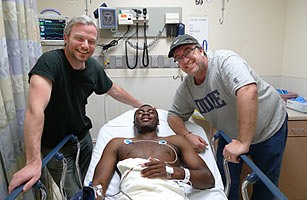
E. Benjamin Skinner, left, and Miles Wright smile for the camera after their friend Bill Nathan regained consciousness at Broward General Medical Center in Fort Lauderdale, Fla.
(2 of 2)
In the candlelight of Furth's clinic, Bill lay on his stomach on a mattress on the floor, his arms outstretched. He was in a great deal of pain and had difficulty moving from that position, but he managed a smile when I came in to hold his hand. I lay next to him that night, with Furth resting on an adjacent mattress. It was a sleepless night: on the other side of the wall lay a trapped dog that howled whenever tremors moved the rocks around it. Furth said it had been slowly starving to death for four days. The clinic had just finished the last of its clean water.
The next morning, I helped Furth make her rounds of the refugee camp, and we rushed Bill by van to the airport. We faced resistance from the Marines who were guarding the entrance. Attempting to make order from chaos, they were understandably wary of admitting a nonresponsive Haitian, even when he was carried by three passport-holding Americans. Finally, a lieutenant named Brandon, disciplined but sympathetic, heard my plea: "It's a matter of honor," I said. "This man saved my life, and I need to help him." ABC News anchor Dan Harris, a mutual friend of Bill's and mine, backed up my story, and Brandon waved us through. French medics gave Bill a morphine drip, and we loaded him, along with a 19-year-old American who survived the quake, onto our waiting charter.
Why did Bill deserve a special mission? Not just because he saved my life. Helping people is what Bill Nathan does. Orphaned at age 7, Bill was taken in as a slave by his neighbors, who forced him to do domestic work and beat him mercilessly when he did not perform to standard. According to UNICEF studies, child slaves number as many as 300,000 in Haiti; some desperate parents yield their own children to fraudulent recruiters, a phenomenon that becomes more pronounced after natural disasters. After three years of bondage, Bill was rescued by an American nun who had known Bill's mother. She brought him to Maison St. Joseph, where he thrived and soon was managing the recovery of hundreds of other boys. "God kept me alive for a reason," he told me in a fleeting moment of lucidity. "I will keep doing the work that I'm doing." There is a theory of massive-disaster triage that the first people who should receive treatment are doctors with non-life-threatening injuries. Although Bill is not a doctor, he has a demonstrated ability to improve the lives of hundreds, and to resurrect his community and country. Saving Bill means saving more lives.
The fall that Bill endured should have killed him, but he was in peak physical shape. His injuries are painful but survivable. While his condition continues to be assessed, we know he has suffered an abrasion on his liver, broken ribs, extensive muscle damage around his vertebral column and cuts and contusions all over his body. The Israeli trauma specialist who attended to Bill upon arrival in Fort Lauderdale said he had seen some lucky patients since he first began practicing medicine as a war medic in 1965 and that Bill was certainly among them. "We can debate the role of luck, I suppose," muttered Miles, who is a devout Christian. Maybe Bill has good fortune on his side; maybe he has God. He certainly has friends.
E. Benjamin Skinner is the author of A Crime So Monstrous: Face-to-Face with Modern-Day Slavery (Free Press, 2008). Contributions to Kez Furth's mission can be sent to Angel Missions Haiti. Contributions for the rebuilding of Maison St. Joseph can be sent through Hearts With Haiti.